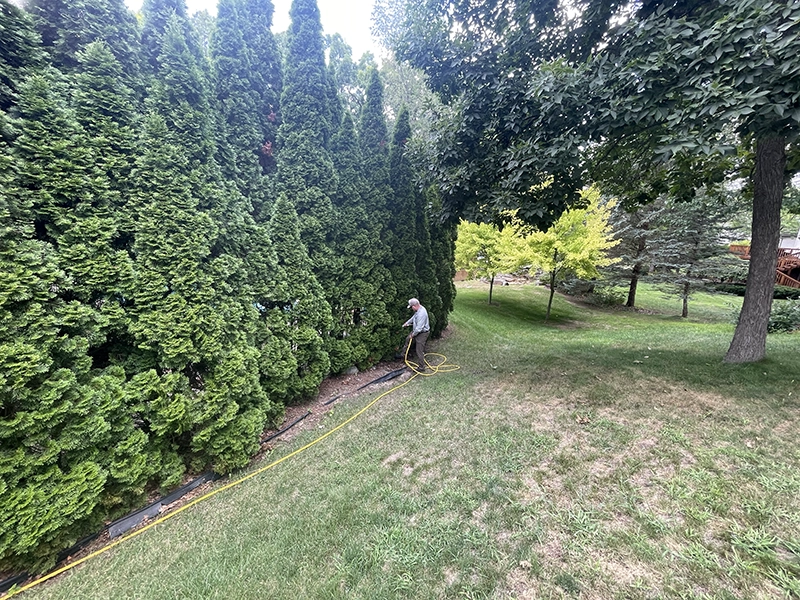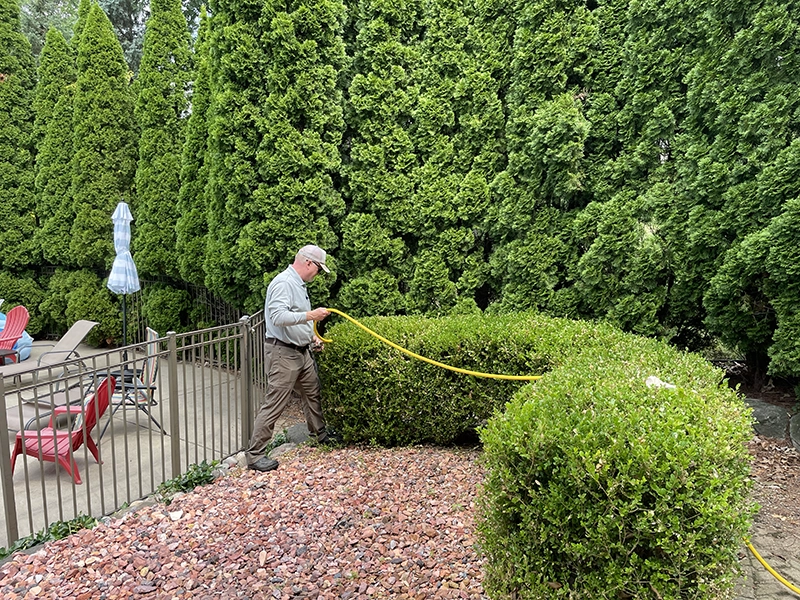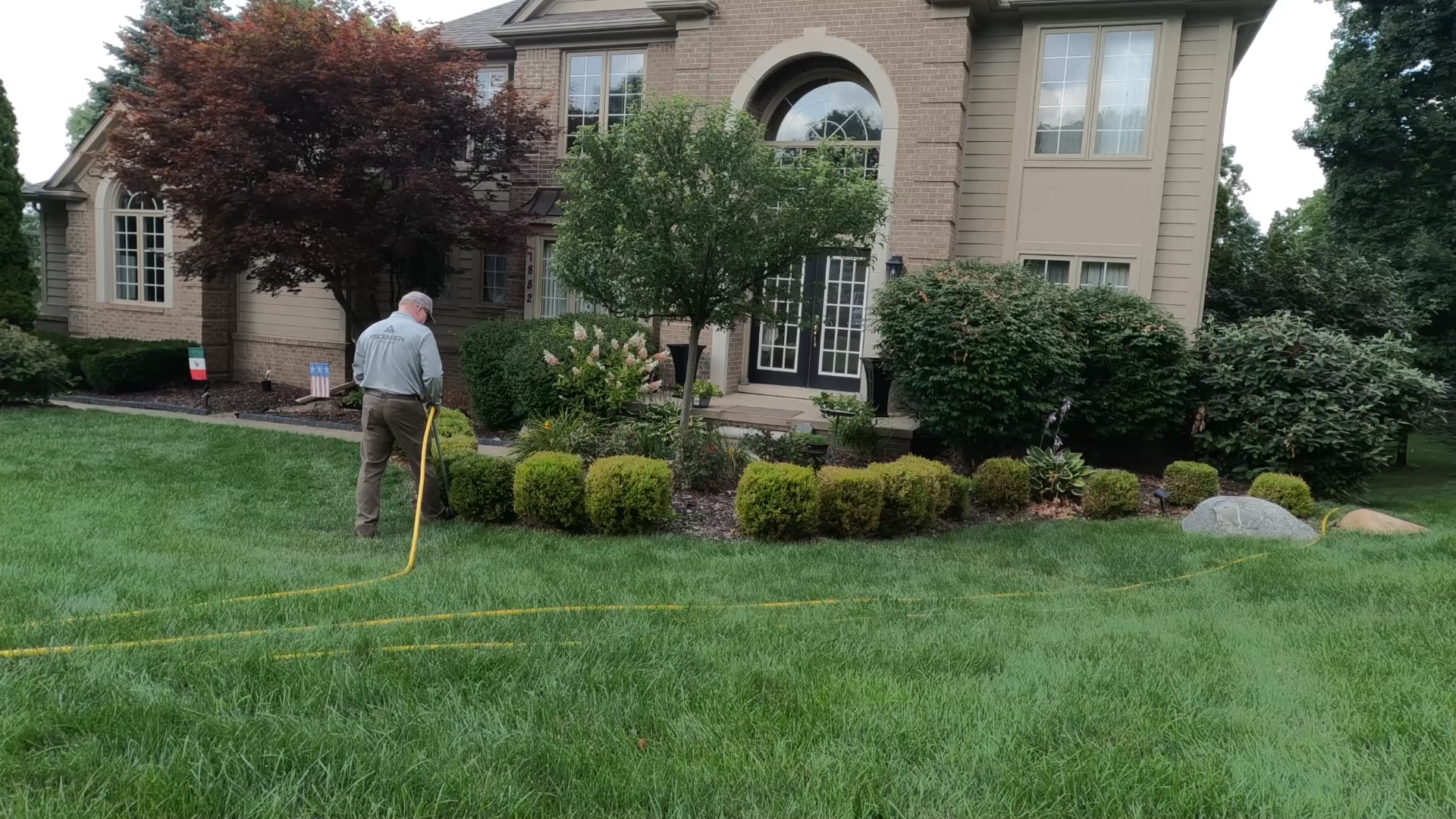Healthy trees growing on your property don’t happen by chance. Your landscape’s plant life needs your support if you want it to reach its full potential. You need to make sure that they get their basic needs to grow strong and healthy. If it’s the nutrients that need a boost, deep root fertilization can fill the gap.
But what exactly is deep root fertilization? Read on to learn more about this root-feeding method and why it’s a common component of Plant Health Care (PHC) programs.

What is Deep Root Fertilization?
Deep root fertilization is a method of fertilizing trees and shrubs that involves injecting the soil with a mixture of essential nutrients, organic matter, and other plant food.
With this technique, the tree roots absorb vital nutrients much more quickly and efficiently.
Unlike surface fertilizers or slow-release fertilizers that are spread on top of the soil and need to be “watered in” first before they reach the root system, the deep-root method skips the gradual soil absorption.
It introduces the fertilizer straight to the underground roots.
Benefits of Deep Root Fertilization
Choosing deep root fertilization to promote good health for your trees and shrubs comes with multiple benefits compared to other techniques.
For one, the deep-root fertilizer is injected directly into the soil, eliminating obstacles to nutrient absorption.
If you do your own surface fertilization, you can expect that many of the nutrients from your solution are washed away, absorbed by the grass, or disrupted by foot traffic around your tree.

There’s also the soil aeration.
When deep-root fertilizing, the poked holes in the tree site also break up the soil compaction, allowing the feeder roots underneath to receive more water, oxygen, and organic nutrients.
When done right, this method can significantly improve your tree’s health and appearance.
Aside from the healthy growth rate, your tree also grows a fuller, more vibrant canopy.
Because of its many benefits, deep root fertilization is recommended as part of regular tree care.
Signs Your Tree Needs Deep Root Fertilization
Your trees can live without the use of a deep-root fertilizer, but there’s a good reason why arborists often include it in their PHC programs.
It’s more than just a remedy for struggling and sickly trees; the health improvement it brings can also save you from costly disease and pest control services.
If your tree shows these signs of nutrient deficiency, that’s your cue to call an arborist:
- Your tree is defoliating or shedding its leaves prematurely.
- Slower tree growth compared to other trees of the same species.
- Fewer flowers or fruits than usual.
- Yellowing or pale leaves.
- Weak and falling branches.
- Stunted growth of new shoots.
- Sparse foliage.
How is Deep Root Fertilization Done in Milford?
Deep root fertilization requires the expertise and equipment of professionals, so it’s best to leave it to them to help your tree out.
- The process begins with an assessment by a tree care professional. An arborist inspects your tree and its site with a soil test to check if there are any nutrient deficiencies.
- Once your tree’s needs are identified, the appropriate liquid fertilizer is loaded into a specialized equipment, such as a high-pressure probe.
- The fertilizer is injected into the soil, about 5-14 inches deep in the root zone, in a grid pattern that reaches up to the dripline.
How often should you use deep root fertilizer?
The frequency varies based on several factors, such as the current health of your trees and soil conditions, but it’s best to do it once or twice a year.
The best times for deep root injections are during Michigan’s spring and fall seasons.
Feeding in the spring can boost new growth, while fertilization treatments in the fall can supply your tree with its needed nourishment before the dormancy period settles in.

Deep Root Fertilization for Plant Health Care
Seasoned tree experts know that the best way to care for trees is to do it proactively.
Plant Health Care (PHC) is the tree care approach that focuses on actively improving and maintaining your trees’ overall health, instead of taking action only when they show signs of decline.
This is achieved through a year-round plan designed specifically to help your trees thrive.
The program often consists of tree care services such as routine pruning, mulching, and deep root fertilization.
Trusted Arborists at Your Service
Get the most out of your trees with the help of Milford, Michigan’s trusted tree service company, Ascension Tree Care.
Our ISA-certified arborists are equipped with extensive tree expertise, years of experience, and the right tools to provide you with effective PHC programs tailored to your trees’ needs, from assessment to execution.
If you want your Milford trees to flourish and keep them protected from pests and diseases, contact us for our Plant Health Care services.
